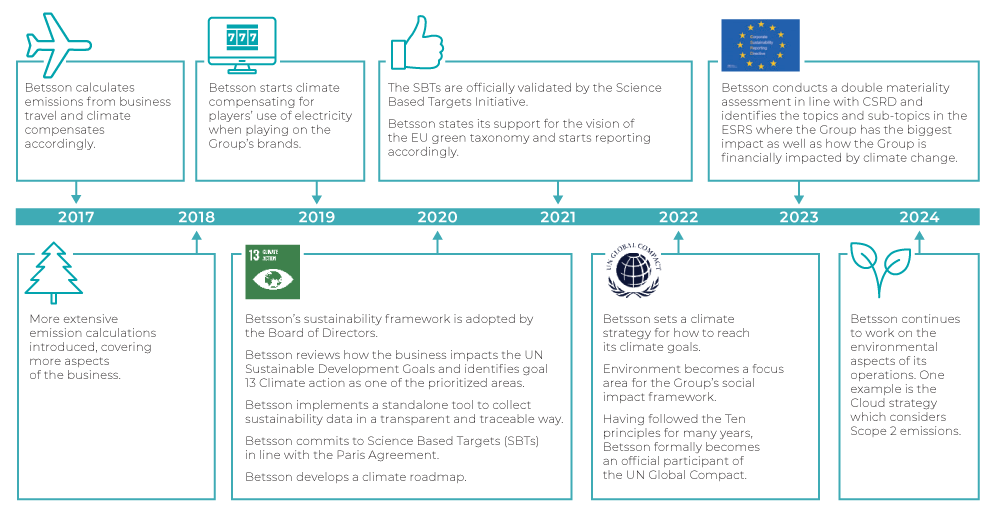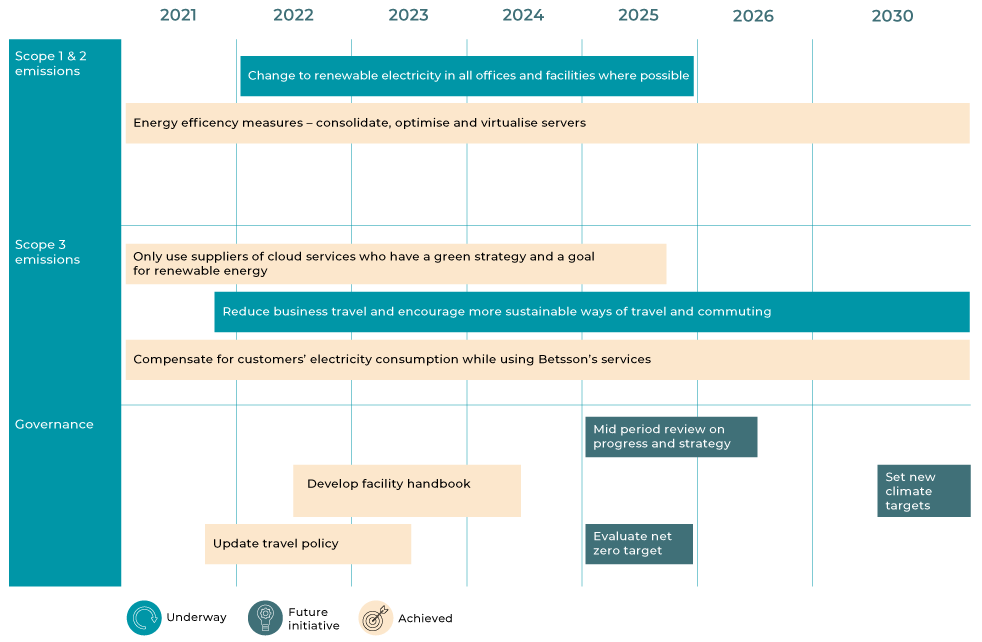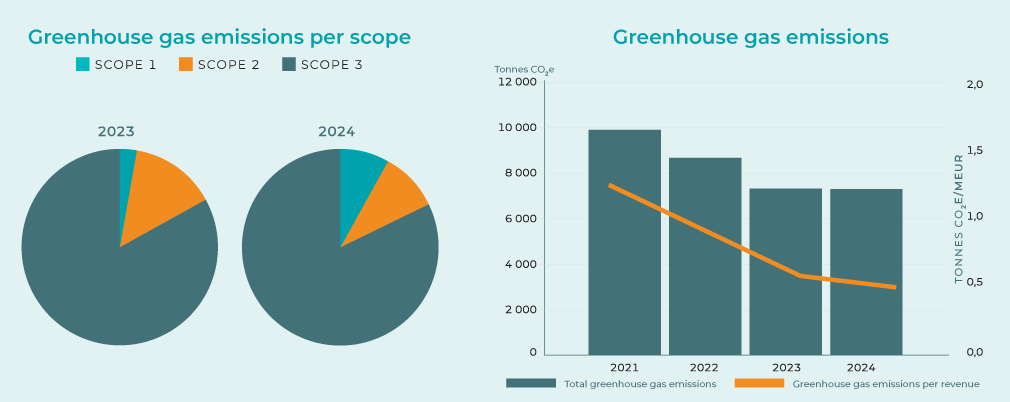
Betsson is an online technology company, meaning relatively low CO2 emissions compared to many other companies in the entertainment sector. The Group has set science-based targets, officially validated by the Science Based Target initiative (SBTi), to ensure that its climate work is aligned with the Paris agreement, and climate compensates for its emissions, including emissions from the electricity customers use when they play on the Group’s gaming sites.
Reduced emissions based on targets validated by the Science Based Targets initiative
- Reduce direct and indirect emissions of greenhouse gases from own operations and indirectly from purchased energy (Scopes 1 and 2) by at least 55% by 2030 from the 2019 baseline level.
- Reduce indirect greenhouse gas emissions that occur in the value chain (purchased energy not included) for Betsson's operations (Scope 3) by at least 15% from the 2019 baseline level.
- 100% climate-neutral business.
- 30 % decrease in emissions of direct and indirect greenhouse gases from own operations and indirectly from purchased energy (Scope 1 and Scope 2).
- 3 % increase in emissions of indirect greenhouse gases (Scope 3).
- Betsson is a 100% climate-neutral business.
Scope 1: Direct greenhouse emissions from the business.
Scope 2: Indirect greenhouse gas emissions.
Scope 3: All other indirect greenhouse gas emissions from the business’s activities, where the emissions come from sources outside the business and are more difficult to influence directly.
Already back in 2017, Betsson collected data about the Group’s business travel and climate compensated for the emissions caused. Since then, the Group has taken subsequent steps to improve its climate efforts among other by setting official climate goals and developing a climate roadmap and strategy.

Governance of climate impact
- Sustainability policy
- Validated science-based targets according to the Science Based Targets initiative (SBTi)
- Climate roadmap of how to tackle main emission sources
- Climate action plans to reduce emissions
- Standalone tool for collection of sustainability related data
- Emission factors for climate compensation based on the Greenhouse Gas Protocol
The SBTi is a partnership between CDP, the United Nations Global Compact, World Resources Institute (WRI) and the World Wide Fund for Nature (WWF). Science-based targets are emission reduction targets in line with what the latest climate science says is needed to meet the goals of the Paris Agreement. Betsson has committed to pursuing efforts to limit warming to 1.5°C and has set targets accordingly (see table).

Betsson’s climate roadmap identifies the main priorities for the Group’s efforts to reach its science-based targets. Betsson's head of sustainability is responsible for the progress of the climate roadmap. The responsible departments within Betsson drive work within each area to reach the climate goals. When it comes to customers’ electricity use while using the Group's products, Betsson will continue to climate compensate for this.
As an online gaming company, the Group needs servers both for its customers to play and employees to work. In recent years, Betsson has consolidated, optimised, and virtualised its servers to improve energy efficiency. The Group only uses suppliers of cloud services who have a green strategy and goals for renewable energy use.
Another area that causes emissions is business travel. According to Betsson’s Code of Conduct, virtual meetings must be chosen in the first instance, and according to the Group travel policy, employees must have travel applications approved. by a member of the management team.

During 2024, Betsson's total emissions remained stable with a slight decrease of 0.3% of total greenhouse gas emissions compared to 2023.
82% of Betsson's total emissions in 2024 are in scope 3, where emissions come from sources outside the business, which are more difficult to influence directly. The largest emission category within scope 3 is business travel, followed by employee commuting and purchased goods and services.
The primary increase in direct emissions arises from Scope 1, largely due to refrigerant leaks at offices in Malta, which have since then been fixed. The most notable reduction in emissions is found in energy use in Scope 2, resulting mainly from decreased electricity consumption in certain offices.
In this year’s accounting exercise, Betsson updated its accounting methodology with more efficient reporting practices. In terms of indirect emissions, the main drivers of the increase are employee commuting, which is attributable to a growing workforce. Furthermore, business travel and purchased goods and services have also increased. These increases reflect both the updated methodology and the surge in activity levels. Emissions associated with the use of sold products declined due to the adoption of a more specific calculation methodology, and not due to a decrease in hours played by customers.

Betsson uses an external tool in order to track climate emissions as well as other sustainability metrics across functions and offices. The tool ensures traceability and a clear view of the emission sources. The data reported into the tool is the basis for the Group’s climate calculations, which are conducted by an external partner.

